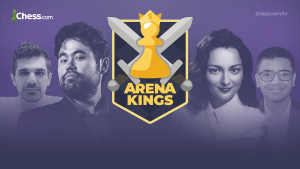
Study Plan For Advanced Players: Bringing It All Together
Target Skill Range: Advanced Path (Rated 1800-1999)
Tasks:
- Play 50 standard time control games.
- Analyze your personal games.
- Document your mistakes.
- Work through these lessons.
- Follow Chess.com/news.
Wow! You've ventured through a lot of material by now. You've honed your openings, strategy, tactics, and endgames! What could possibly be left to work on at the advanced level? Glad you asked! The next step is to combine all those elements. People assume that chess is composed of discrete elements, but actually from "a non-linear, non-subjective point of view, it is more like a big ball of wibbily-wobbly timey-wimey ... stuff." The next step is to appreciate the whole course of the game, how elements like tactics relate to strategy, and how phases of the game transition. Hone your understanding of these relationships and transitions with the following exercises.
1. Play 50 standard-time-control games.
Everybody loves blitz games, and everybody loves study, but eventually you have to test your skills in the world classical chess. There is simply no better way to challenge yourself to delve deeply into positions.
To get the most out of this exercise, try to play tournaments over the board. Here at Chess.com, we love online chess, and we are proud to say that we have the best online chess community, but there is no substitute to going toe-to-toe with someone who is sitting physically across from you. After most over-the-board games, you will also have the chance to discuss the game with your opponent. That is an invaluable learning experience. The best way to get over-the-board games is to find the website for your local federation and locate a tournament. If you are playing in a tournament, there are the added stakes of cash on the line which can drive you to play at your very best.
If you are unable to find in-person competition, the very best alternative is to join the World Standard Time Control Chess Club. With over 4,000 members, you will have no trouble finding the 90+30 games the group is dedicated to.
2. Analyze your personal games.
You had a feeling this was coming didn't you? It does you little good to play games and not to review them. Whether standard games or blitz games, over the board or online, you need to identify where you went wrong in your games. Analyzing your games is the very best way to track your strengths and weaknesses. Improve your understanding of the process of analysis with this article from GM Sam Shankland.
Supplement Shankland's article with the following video, in which he puts his method into practice.
Computer analysis is the best way to analyze; it's like having a 3000+ player at your beck and call! GM Daniel Naroditsky shows you how to incorporate computer analysis into your process.
3. Document your mistakes.
Sometimes putting something down on paper can give you insights you would otherwise miss. In this exercise, prepare a document and track the mistakes you have made. Count them, try to identify the root cause, and try to identify a plan for improvement. The plan may just be to be aware of the issue. If you consistently get down on time, note that and try not to do it in future ![]() If you always underestimate your opponent's attacks, try to review some Chess.com videos on attacking play and improve your evaluation of attacking play.
If you always underestimate your opponent's attacks, try to review some Chess.com videos on attacking play and improve your evaluation of attacking play.
This method is described in IM Axel Smith's book, "Pump Up Your Rating."
Here is an example of a possible list of mistakes that you can use. Don't be afraid to add types of mistakes if you are making an error that is not on the list.
| Category | Type Of Mistake |
| Opening | inefficiency |
| not completing development | |
| improper approach to castling | |
| ignorance of theory | |
| incorrect middlegame transition | |
| Tactics | blunder |
| not considering forcing moves | |
| not responding to threats | |
| ignorance of pattern | |
| miscalculation | |
| not calculating deep enough | |
| Positional Play | incorrect plan |
| playing without a plan | |
| Incorrect use of pawns | |
| incorrect piece exchanges | |
| incorrect piece placement | |
| misevaluation | |
| missing prophylactic moves | |
| unnecessary prophylaxis | |
| Endgames | insufficient time remaining |
| ignorance of theory | |
| Thinking Errors | not making the logical move work |
| not assessing the position | |
| playing without a follow-up | |
| excessive caution | |
| releasing the tension | |
| reluctance to sacrifice | |
| overly eager to sacrifice | |
| Attitude | lack of respect for the opponent |
| deference to opponent | |
| not striving for maximum result | |
| getting into time trouble | |
| playing too fast |
4. Work through these lessons.
Hone your full-game perspective by playing through complete games in lessons. This will allow you to get a sense for how a master builds and executes in a position.
You can test yourself against many of the best players of all time with any of the "Play Like" courses.
5. Follow Chess.com/news.
Is this a self-serving suggestion? Well, maybe. But it is also really good advice! At this level, you should be paying attention to elite chess.
There are all sorts of opening ideas, innovative new classics, and unique strategic concepts in the news reports. Find some favorite players and track their games especially.






